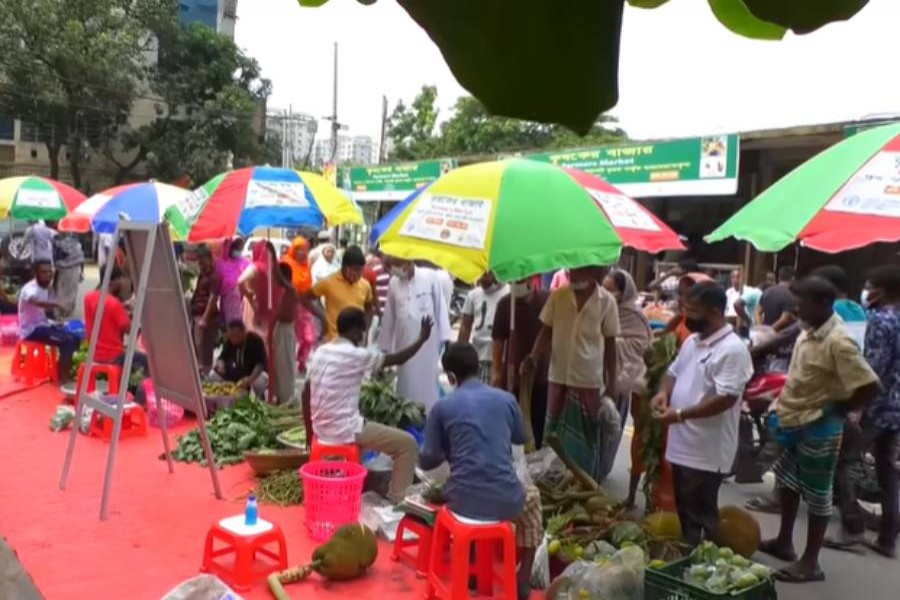Called 'Krishaker bazaar' (farmers' market), the weekly temporary holiday outlets have their name somewhat misleading. Like women's markets where women-only are the sellers and buyers, here farmers are only one party ---sellers that is---and the other party is a select band of city customers which is sensitive about what it purchases from the market.
Anyway, when the issue in question is supply of safe foods---vegetables, fruits and maybe, a few common spices --- in this case, the initiative is highly laudable. In a country where foods are adulterated in unimaginable ways and rampant use of chemical fertilisers, pesticides and herbicides is prevalent, here is an attempt to ensure that farm produce grown organically is available to customers who take extra care for procuring such foodstuffs. Farmers themselves take their produce to a makeshift market for sale. Several agencies under the ministry of agriculture are involved with the process of selection, supervision of farmers and cultivation as well as support for making the exclusive market a reality.
In the past couple of weeks, at least three such farmers' markets have made their debut in Mohammadpur, Azimpur and Adabar. It seems these are part of the 15 farmers' markets planned early in May this year to be opened in Dhaka and a few townships in close proximity. The first such market has been running successfully on the premises of the BADC (Bangladesh Agriculture Development Corporation) Sech Bhaban since the first weekly holidays of December, 2019. There is no reason why the recently inaugurated ones will not follow suit.
Yet it must be admitted that compared to the enormous number of residents of Dhaka, who would prefer buying these fresh produce directly from farmers, the supply cannot prove to be more than a drop in the ocean. At a time when every consumable is outrageously costly, not all can avail of this opportunity. Some people living close by one of these markets will never venture into such markets considering their shoe-string family budgets. Once again, social discrimination cannot be avoided in cases where the privileged with money power has the advantage of ruling the roost.
What ideally should have been is that foods ---in fact every consumable item ---had to be hundred per cent safe for human health. Of course in terms of size, shape and look, qualities of farm produce may vary but there should have been no compromise on the safety issue. Unfortunately, this issue has ever remained neglected and this is why initiatives like farmers' markets have to be taken.
In a country where restaurants, factories, bakeries (quite a few of them are reputed for their brands) and even bottling facilities of drinking waters are engaged in malpractices and are slapped fines for such clandestine activities, the very mindset of people in businesses is questionable. How can people use extremely harmful chemical agents in foods and ingredients used for preparation of foodstuffs?
That this is outright criminal and fines alone fall short of justice by miles hardly occurs to all involved with the process. True, people all over the world had to opt for modern farming involving high yielding varieties of cereals, vegetables and fruits developed in the laboratory as also chemical fertilisers and pesticides in order to feed the growing population. But in underdeveloped countries ---one of which Bangladesh was until recently, fertilisers and insecticides have been used indiscriminately leading to all kinds of seriously adverse impacts on the soil, water and the overall environment.
Sane people have long sounded the alarm bell ringing. Policymakers have also started to realise the danger of eating produce heavily laced with the poisonous fertilisers and pesticides. This is a reverse journey for organic farming and farmers' market is part of the venture. Now the challenge is to ensure that every citizen of the country enjoys safe foods. This is a daunting challenge but at least these farmers have shown the way. Their good work has to be extended bit by bit all across the country in order to build a regime of cultivation, storage, supply, processing and preparation of safe foods.


